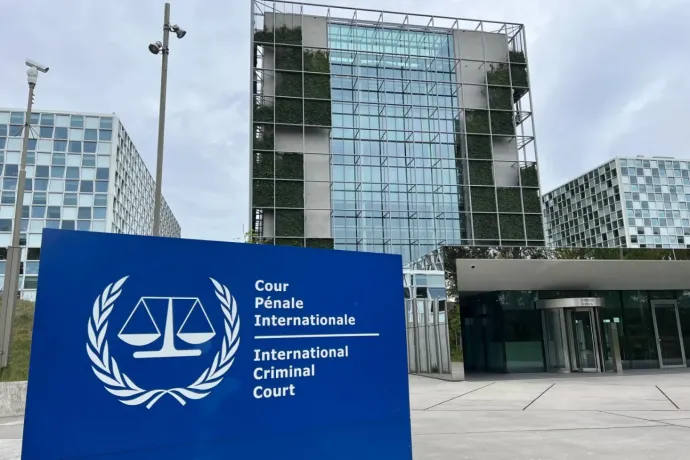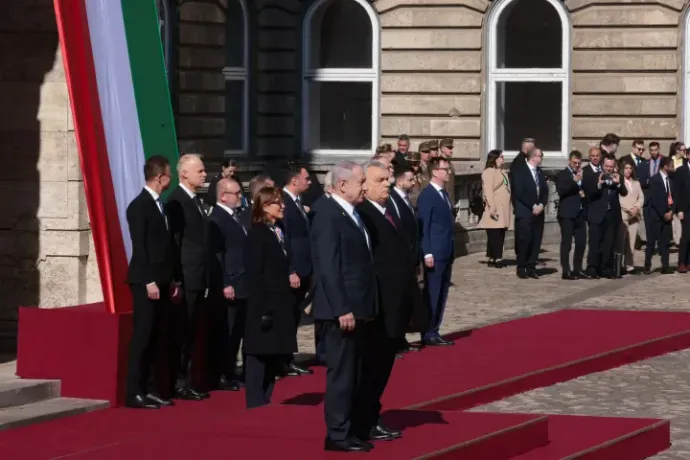
The Hungarian government has decided to withdraw from the International Criminal Court (ICC), the Minister in charge of the Prime Minister's Office told MTI on Thursday. Gergely Gulyás said that the government will initiate the termination procedure on Thursday in accordance with the constitutional and international legal framework.
The ICC was "a respectable initiative", but what we have recently been seeing – and the indictment of Israeli Prime Minister Benjamin Netanyahu is the saddest example of this – is that it has become a political body, Gulyás added. The minister stressed that the government considers this unacceptable and has therefore decided not to participate in the work of the ICC.
The announcement was made shortly before Prime Minister Viktor Orbán's received Israeli Prime Minister Benjamin Netanyahu on the same day. Orbán had invited Netanyahu to Hungary in November 2024, after the ICC issued an international arrest warrant for the Israeli leader, accusing him of deliberately starving the people of the Gaza Strip.
Hungary's government declared at the time that it would ignore the decision of the Hague body, which it described as absurd and shameful. The government stated that it not only rejected the decision in principle, but also wanted to prove this in practice as soon as possible. Netanyahu arrived in Hungary early Thursday morning and will stay there until Sunday morning.
Orbán is sending a strong message to the world with Netanyahu’s visit
The International Criminal Court issued arrest warrants for Netanyahu and former Israeli Defence Minister Yoav Gallant on war crimes charges in mid-November. The ICC also issued an arrest warrant for Mohammed Deif, the mastermind of Hamas's 7 October 2023 terrorist attack, but he had been liquidated months earlier.
On October 7, 2023, Hamas launched a bloody terrorist attack against Israeli settlements near the Gaza Strip, killing 1200 people, including 840 civilians, and taking 250 hostages. In response, Israel launched a military offensive in the Gaza Strip, aimed at dismantling Hamas and freeing the hostages. Since then, much of the Gaza Strip's buildings and infrastructure have been destroyed or damaged, and according to the Hamas-controlled health ministry, more than 50,000 people have died whilst 1.9 million Palestinians have been displaced, according to UN figures. Israel disputes these figures.
According to the ICC, Netanyahu may have committed crimes against humanity, and there are reasonable grounds for that suspicion. The court cited using the starvation of civilians as a weapon of warfare as an example, but Netanyahu is also suspected of murder, persecution and other inhumane acts. Israel challenged the jurisdiction of the court in the case, which was dismissed. Netanyahu's office has called the court's decision absurd and anti-Semitic, and said the panel was politically motivated and discriminatory.
While it was known in advance that there although the legal basis for arresting Netanyahu as soon as he entered Hungarian territory was there, it was certain that this would not happen during the Israeli Prime Minister's visit between Thrusday and Sunday, even if Hungary had merely breached its international legal obligations without initiating its withdrawal from the ICC.
The visit also sends the deliberate message from the Hungarian side that it will not enforce the ICC arrest warrant.
In such a case, the ICC will initiate a procedure, declare a breach of obligations and condemn the country concerned. The last time this happened was last autumn, when Russian President Vladimir Putin visited Mongolia, and of course he was not arrested. However, Mongolia has not withdrawn from the ICC.
There are no significant immediate legal consequences of the Hungarian government's disregard of the ICC ruling, but indirectly, as additional proof of Hungary's shortcomings regarding the rule of law, it could also have an impact on the EU's infringement proceedings against Hungary, which are key to Hungary's access to EU funds which are currently still frozen international lawyer Tamás Hoffmann said ahead of Netanyahu's arrival. “The Rome Statute has been adopted by all EU member states, so the ICC is part of the concept of the rule of law.”

Speaking prior to Gulyás's announcement, Hoffmann said that by withdrawing from the ICC, "the Hungarian government would be sending the message that taking action against international crimes is not important to Hungary, which is once again contrary to the idea of the rule of law. One cannot be committed to the rule of law and reject action against persons accused of international crimes at the same time."
Hungary is the only EU member state which will not be part of the ICC. The withdrawal is a year-long process, as it is not possible to end a legal commitment overnight. As 24.hu previously reported, for Hungary to withdraw, it needs to send a written notification to UN Secretary General António Guterres, which will take effect after one year. A decision by the Parliament is also needed, as the decision to join was also taken by the Parliament.
Hungary's defiance of the ICC
The day after the arrest warrant against Netanyahu was issued, speaking in his semi-regular Friday morning interview on Kossuth Rádió, Orbán announced that he would invite Netanyahu to Hungary and would guarantee to him that the ICC's verdict would not have any effect in Hungary. "International institutions are not acting prudently when making certain decisions," argued Orbán, who said the ICC's decision was cynical because it was interfering in an ongoing conflict for political purposes. "There is no other choice here, we must oppose this decision," he said.
As early as November, Foreign Minister Péter Szijjártó called the issuing of the arrest warrant absurd and shameful, and on 8 February this year he posted about having spoken to his Israeli counterpart Gideon Saar on the phone. He also wrote that they agreed that the ICC had become seriously politicised and that "the ICC has discredited the international court system". The Hungarian Foreign Minister concluded his post by saying that "Hungary would also reassess its future participation in the organisation".
At a government briefing in February, Minister at the Prime Minister's Office, Gergely Gulyás said that "if an international judicial forum becomes a political body, there is no point in being a member". But he added that if Hungary were to withdraw from the ICC, it would not solve everything, because it is part of the EU legal order, however, the Hungarian parliament has not made the ICC's founding document part of the country's legal order.
24.hu was the first to report that after the arrest warrant against Netanyahu was issued, Viktor Orbán had asked three of his ministers – Gergely Gulyás, Bence Tuzson, Minister of Justice, and János Bóka, Minister of EU Affairs – to prepare a note on the potential consequences of Hungary's withdrawal from the ICC, with a special focus on EU-related consequences. In the run-up to Netanyahu's visit, Szabad Európa reported that, when speaking at a meeting of ambassadors last week, Bence Tuzson had said that Hungary would withdraw from the ICC.
Instead of promulgation, Hungary will leave
In his announcement on Thursday, Gulyás said that Hungary was already in a special situation because, unlike other ICC member states, the Parliament had never promulgated the statute of the court, so it has not been part of domestic law. This is why it is our clear legal position that no one could be arrested in Hungary based on this, nor could "any proceedings" be initiated against anyone, Gulyás pointed out.
He explained that Hungary does not intend to resolve the aforementioned ambiguous situation by promulgating the statute, but will instead leave the ICC as a result of the withdrawal procedure.
The minister added that the ICC's activities have "raised serious concerns" at the international level in recent times. The US, China and Turkey have never been members of the ICC, and the US Congress even decided to sanction ICC judges with bipartisan support. Furthermore, even some European partners, including the incoming German Chancellor and the incumbent Polish Prime Minister, have made it clear that they would ignore the Court's ruling despite their domestic legal obligations to do so, and the Israeli Prime Minister is welcome to attend.
All this proves that the ICC's activities have "deviated from their original purpose" and since it "has become a political court", Hungary does not wish to be a member in the future, Gulyás said.
About the ICC
The Hague-based ICC was established in 2002 under the 1998 Rome Statute. It is accountable only to countries that have ratified the document, of which there are currently 124 (this map shows where each country stands). The statute has not been ratified by Russia, the United States and China, among others. In spite of this, as we have previously reported, the arrest warrants issued by the court can still not be considered symbolic. Israel also is not a member of the ICC, which is why it questioned the body's jurisdiction in the conflict. However, the ICC rejected this argument on the grounds that in 2015, the Palestinian Authority formally agreed to be bound by the principles of the body.
This is not the first time that the Hungarian government has not considered an ICC arrest warrant binding: the most recent example of this was in early 2023, when the government indicated that it would not enforce the arrest warrant issued against Vladimir Putin if the Russian president were to visit Hungary.
However, the government's rhetoric on the two cases is not the same. In Putin's case, the government put forward a legal argument, saying that although Hungary had signed the Rome Statute – accepting the ICC's jurisdiction – and the parliament had ratified it, but since it had not been promulgated, it was not part of the Hungarian legal order and would be contrary to the Hungarian constitution. While it was not promulgated, the fact that Hungary signed the Rome Statute in 2002, and the parliament ratified it means that Hungary has agreed to its obligations as a party to the ICC. However, Hungary has yet to make the necessary legislative amendments needed to bring the Hungarian legal system into line with the requirements of the Statute of the International Court of Justice. It is interesting, by the way, that Hungary ratified the Rome Statute of the International Criminal Court on 6 November 2001, during the first Orbán government.
Netanyahu expressed his appreciation for Hungary's support when he responded to Orbán's invitation last year: "I thank Prime Minister Viktor Orbán for his warm support for me and Israel. In contrast to the shameful weakness of those who support the outrageous decision against Israel's right to self-defence, Hungary – like our American friends – is demonstrating moral clarity, standing up for justice and truth", the Israeli Prime Minister replied to the Hungarian Prime Minister's invitation letter last year.
It was also to be expected that the recent practices of Donald Trump's presidency could encourage some countries to ignore international law. At the beginning of February, Trump signed an executive order imposing sanctions on the International Criminal Court (ICC) for proceedings against the US and its close ally Israel.
Indeed, the Hungarian government has recently made a habit of talking about a court ruling affecting it as if it could be unilaterally ignored. Viktor Orbán's political vocabulary now includes the term "judicial activism", against which one must "rebel" if one feels that a decision is wrong.
For more quick, accurate and impartial news from and about Hungary, subscribe to the Telex English newsletter!